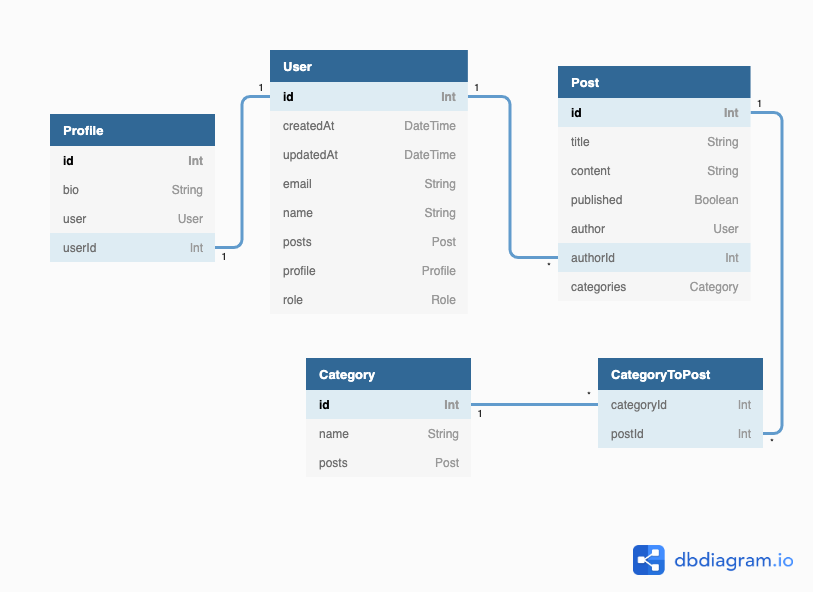
Security News
Browserslist-rs Gets Major Refactor, Cutting Binary Size by Over 1MB
Browserslist-rs now uses static data to reduce binary size by over 1MB, improving memory use and performance for Rust-based frontend tools.
prisma-dbml-generator
Advanced tools
Automatically generate a DBML schema from your Prisma Schema.
Updates every time npx prisma generate runs. Use dbdiagram.io to visualize your dbml files as Entity-Relationship Diagram:

| Prisma | prisma-dbml-generator |
|---|---|
| >=2.29.0 | 0.7.0 |
| <2.29.0 | 0.6.0 |
npm install -D prisma-dbml-generator
schema.prismagenerator dbml {
provider = "prisma-dbml-generator"
}
npx prisma generate for the following schema.prismamodel User {
id Int @id @default(autoincrement())
createdAt DateTime @default(now())
updatedAt DateTime @updatedAt
email String @unique
name String?
posts Post[]
profile Profile?
/// user role
role Role @default(USER)
}
/// User profile
model Profile {
id Int @default(autoincrement()) @id
bio String?
user User @relation(fields: [userId], references: [id])
userId Int @unique
}
model Post {
id Int @id @default(autoincrement())
title String @default("")
content String?
published Boolean @default(false)
author User? @relation(fields: [authorId], references: [id])
authorId Int?
categories Category[]
}
model Category {
id Int @id @default(autoincrement())
name String
posts Post[]
}
/// user role
enum Role {
ADMIN /// allowed to do everything
USER
}
generates the following schema.dbml to prisma/dbml
//// ------------------------------------------------------
//// THIS FILE WAS AUTOMATICALLY GENERATED (DO NOT MODIFY)
//// ------------------------------------------------------
Table User {
id Int [pk, increment]
createdAt DateTime [default: `now()`, not null]
updatedAt DateTime [not null]
email String [unique, not null]
name String
posts Post
profile Profile
role Role [not null, default: 'USER', note: 'user role']
}
Table Profile {
id Int [pk, increment]
bio String
user User [not null]
userId Int [unique, not null]
Note: 'User profile'
}
Table Post {
id Int [pk, increment]
title String [not null, default: '']
content String
published Boolean [not null, default: false]
author User
authorId Int
categories Category
}
Table Category {
id Int [pk, increment]
name String [not null]
posts Post
}
Table CategoryToPost {
categoriesId Int [ref: > Category.id]
postsId Int [ref: > Post.id]
}
Enum Role {
ADMIN
USER
}
Ref: Profile.userId - User.id
Ref: Post.authorId > User.id
schema.dbml| Option | Description | Type | Default |
|---|---|---|---|
projectDatabaseType | Project database type for dbdocs | string | null |
projectName | Project name for dbdocs | string | null |
projectNote | Project note for dbdocs | string | null |
projectNotePath | Project note path to a markdown file for dbdocs | string | null |
output | Output directory for the DBML file | string | ./dbml |
outputName | Name for the DBML file | string | schema.dbml |
manyToMany | Create Many-To-Many join table | boolean | true |
mapToDbSchema | Use mapped table name | boolean | true |
includeRelationFields | Include relation fields | boolean | true |
Use additional options in the schema.prisma
generator dbml {
provider = "prisma-dbml-generator"
output = "../dbml"
outputName = "awesome.dbml"
projectName = "Project Name"
projectDatabaseType = "PostgreSQL"
projectNote = "Test project description"
}
npm run dev
npm test
FAQs
Prisma DBML Generator
The npm package prisma-dbml-generator receives a total of 60,925 weekly downloads. As such, prisma-dbml-generator popularity was classified as popular.
We found that prisma-dbml-generator demonstrated a not healthy version release cadence and project activity because the last version was released a year ago. It has 1 open source maintainer collaborating on the project.
Did you know?

Socket for GitHub automatically highlights issues in each pull request and monitors the health of all your open source dependencies. Discover the contents of your packages and block harmful activity before you install or update your dependencies.

Security News
Browserslist-rs now uses static data to reduce binary size by over 1MB, improving memory use and performance for Rust-based frontend tools.

Research
Security News
Eight new malicious Firefox extensions impersonate games, steal OAuth tokens, hijack sessions, and exploit browser permissions to spy on users.

Security News
The official Go SDK for the Model Context Protocol is in development, with a stable, production-ready release expected by August 2025.